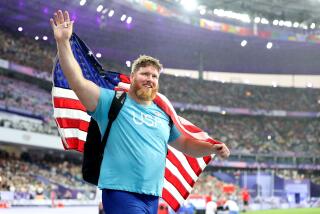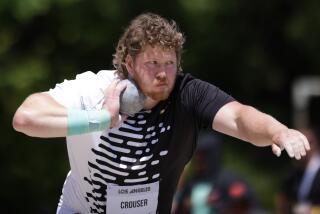Decision on Randy Barnes’ Drug Test Delayed : Track and field: Error in paper work raises doubt in ruling on shotputter. Two commission members want more information before making report.
- Share via
Although U.S. shotputter Randy Barnes reportedly tested positive for an anabolic steroid at a meet two months ago in Sweden, the International Amateur Athletic Federation has so far been unable to link the test conclusively to the world record-holder.
Because of the extraordinary circumstances surrounding the case, the IAAF, which governs track and field, has appointed five members of its medical commission to study the evidence and file reports.
IAAF spokesman Mark Butler said this week that he expected to announce the results of the investigation by Friday, but that was postponed when two commission members said they needed more information before they could complete their reports.
“I hope there’s a statement within the next week,” Butler said Friday.
An error in paper work has cast doubt on whether the IAAF can prove that the urine sample in question was provided by Barnes. Traces of a relatively common anabolic steroid, methyltestosterone, were found in the sample.
“Drug testing was meant to deter, not to turn into a disaster,” one IAAF official said.
Barnes was among several athletes tested after a meet Aug. 7 in Malmo, Sweden. After signing a form in triplicate approving the testing procedure, he took one copy with him and left two behind. One of those remained with meet officials at Malmo and the other was sent with the sample to the laboratory in Stockholm.
But, sources said, there is no number on Barnes’ copy of the form to link him to the bottle that contains the positive sample. There are numbers on the duplicate forms that correspond with the number on the bottle, but they apparently were written on the forms after Barnes had left the doping control room. That, according to IAAF rules, is a breach of protocol.
“No one is saying that the forms were tampered with to make it appear as if the sample belonged to the athlete,” a source said. “But some people are saying that it is possible there was tampering. It’s a matter of whether the IAAF gives the athlete the benefit of the doubt.”
One member of the commission said that he would recommend a ruling favorable to Barnes “even if there’s only a 1% doubt in my mind of his guilt.”
Commission members assigned to the investigation are chairman Arne Ljungqvist of Sweden, Manfred Donike and Manfred Hoppner of Germany, Arnold Beckett of England and Frank Greenberg of the United States. Greenberg, president of the national governing body for track and field, said he filed his report to the IAAF last Friday but would not reveal its contents.
“I don’t think it’s appropriate for me to discuss this matter,” he said.
A judgment against Barnes, pending appeals, would result in a two-year suspension, which would disqualify the 24-year-old shotputter from the 1991 World Championships in Tokyo and the 1992 Summer Olympics in Barcelona, Spain. He won the silver medal at the 1988 Summer Olympics.
Telephone calls to his home in Charleston, W. Va., were not returned.
“He’s assured me it’s all going to turn out for the good because he’s not guilty,” said Robert Parker, who coached Barnes at Texas A&M.;
The IAAF usually does not name athletes who are involved in drug investigations, but Barnes’ name was leaked last month to a French sports newspaper, L’Equipe. He said at the time that he has passed several drug tests this year, including one after the Jack-in-the-Box meet in May at UCLA, where he set the world record with a put of 75 feet 10 1/4 inches. Barnes won in Malmo with a put of 74-11 1/4.
Times staff writer Julie Cart contributed to this story.
More to Read
Go beyond the scoreboard
Get the latest on L.A.'s teams in the daily Sports Report newsletter.
You may occasionally receive promotional content from the Los Angeles Times.










